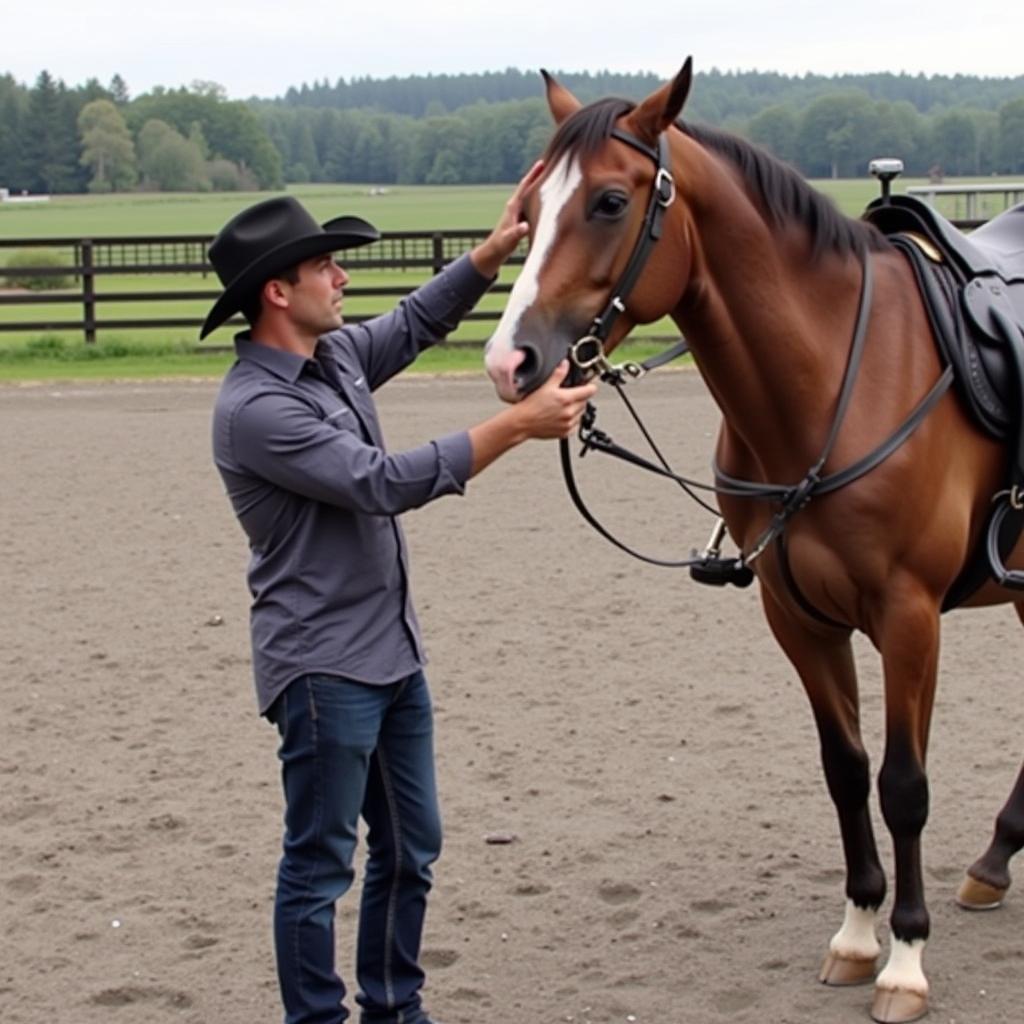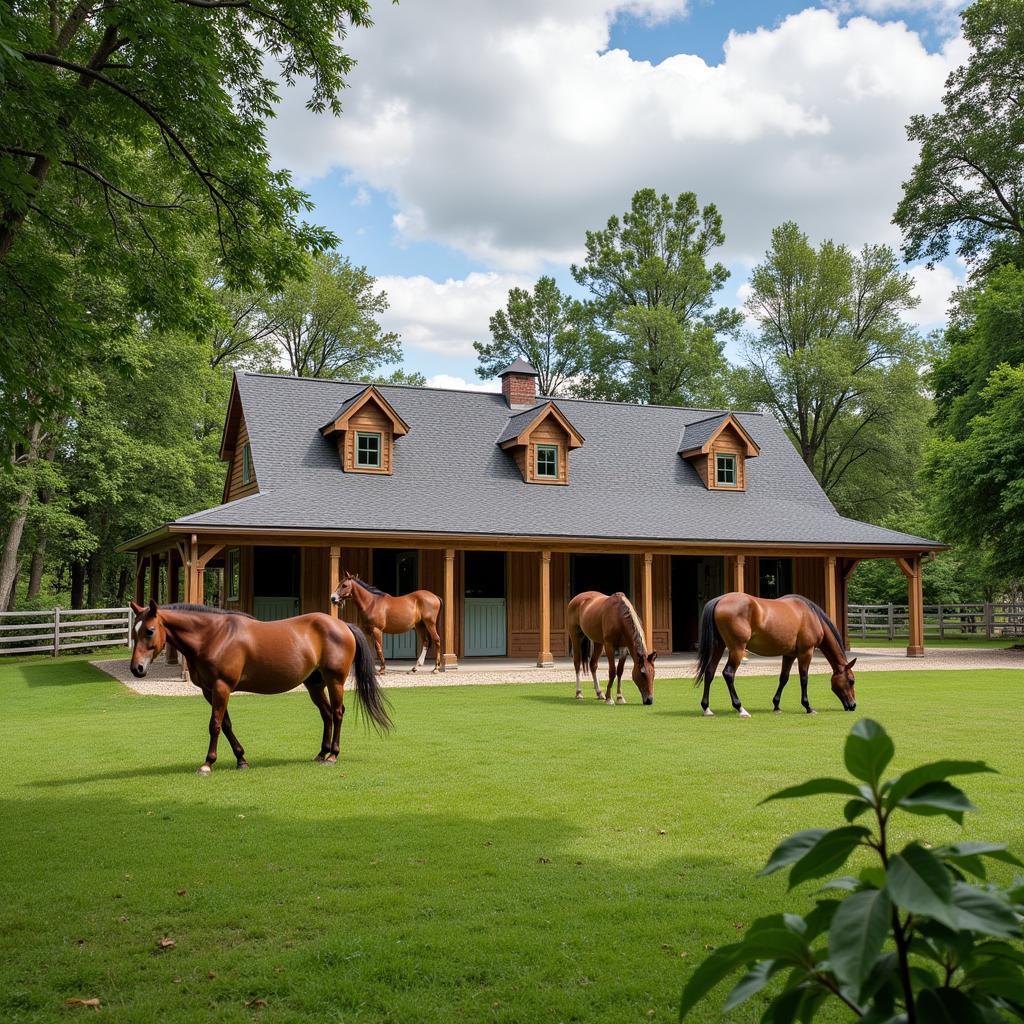Jarrett Lewis Horse Trainer is a topic of much discussion within the equine community. This article aims to explore the world of horse training, focusing on the importance of finding a skilled and compassionate trainer like a hypothetical Jarrett Lewis. Choosing the right trainer can significantly impact your horse’s well-being and development.
Understanding the Importance of a Skilled Horse Trainer
A skilled horse trainer like a hypothetical Jarrett Lewis understands that every horse is an individual with unique needs and learning styles. They build a strong foundation based on trust and mutual respect, creating a positive learning environment for both horse and rider. Effective communication is key, using clear and consistent cues to guide the horse towards desired behaviors.
- Expertise in various disciplines: A good trainer is versatile, adaptable, and knowledgeable in different training methodologies. They can cater their approach to the specific needs of the horse and the rider’s goals, whether it’s dressage, jumping, or Western riding.
- Focus on positive reinforcement: Modern training methods emphasize positive reinforcement and reward-based learning. This approach builds a stronger bond between horse and rider, promoting willingness and cooperation. Punishment-based methods are outdated and can be detrimental to a horse’s mental and physical well-being.
- Emphasis on horse welfare: A reputable trainer prioritizes the horse’s physical and mental health. They understand the importance of proper nutrition, exercise, and rest, ensuring the horse remains healthy and happy throughout the training process.
 Jarrett Lewis Training Techniques
Jarrett Lewis Training Techniques
What to Look for in a Horse Trainer Like Jarrett Lewis
Finding the right horse trainer is crucial for your horse’s development and your own riding journey. Here are some key qualities to consider:
- Experience and qualifications: Look for a trainer with a proven track record of success and relevant certifications or qualifications. Years of experience working with horses demonstrate a deep understanding of equine behavior and training principles.
- Communication skills: Clear and effective communication is essential. A good trainer can clearly explain their methods and provide constructive feedback to both horse and rider.
- Patience and empathy: Training horses requires patience and understanding. Look for a trainer who is calm, compassionate, and able to adapt their approach to suit the individual horse’s temperament.
Building a Strong Foundation: Training Principles
A good horse trainer, like a hypothetical Jarrett Lewis, focuses on building a strong foundation based on trust and mutual respect. Here are some key principles:
- Consistency: Consistent cues and expectations are essential for a horse to understand what is being asked of them. This helps build confidence and reduces confusion.
- Positive reinforcement: Rewarding desired behaviors strengthens the horse’s understanding and encourages them to repeat those actions.
- Patience: Training takes time and patience. Rushing the process can lead to frustration and setbacks.
How can I find a horse trainer like Jarrett Lewis in my area?
Start by asking for referrals from local horse owners, veterinarians, or equine professionals. Online directories and social media groups can also be valuable resources.
What questions should I ask a potential horse trainer?
Inquire about their experience, training philosophy, and approach to horse welfare. Ask for references and visit their facility to observe their interactions with horses.
 Jarrett Lewis Horse Care Facility
Jarrett Lewis Horse Care Facility
Conclusion
Finding a skilled and compassionate horse trainer like a hypothetical Jarrett Lewis is a crucial investment in your horse’s well-being and your riding journey. By understanding the key qualities to look for and the importance of a strong foundation based on trust and mutual respect, you can ensure a positive and successful training experience for both horse and rider. Remember to choose a trainer who prioritizes the horse’s welfare and utilizes positive reinforcement methods. Jarrett Lewis horse trainer exemplifies these principles.
FAQ
- How much does horse training typically cost? Costs vary depending on the trainer’s experience, location, and the type of training.
- How long does it take to train a horse? The timeframe depends on the horse’s age, temperament, and the desired level of training.
- What are the different types of horse training? Various disciplines exist, including dressage, jumping, Western riding, and more.
- How can I find a reputable horse trainer? Seek recommendations from other horse owners and research trainers online.
- What is the importance of positive reinforcement in horse training? Positive reinforcement builds a stronger bond and encourages desired behaviors.
- What should I look for in a horse training facility? A clean, safe, and well-maintained facility is essential for a horse’s well-being.
- How often should I train my horse? The frequency of training sessions depends on the horse’s fitness level and training goals.
Need support? Contact us 24/7: Phone: 0772127271, Email: [email protected] Or visit us at: QGM2+WX2, Vị Trung, Vị Thuỷ, Hậu Giang, Vietnam.